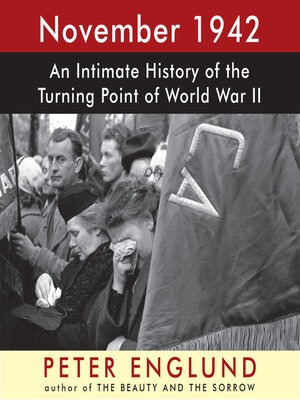November 1942
audiobook (Unabridged) ∣ An Intimate History of the Turning Point of World War II
By Peter Englund

Sign up to save your library
With an OverDrive account, you can save your favorite libraries for at-a-glance information about availability. Find out more about OverDrive accounts.
Find this title in Libby, the library reading app by OverDrive.



Search for a digital library with this title
Title found at these libraries:
| Loading... |
The New York Times Book Review Editors' Choice • An intimate history of the most important month of World War II, completely based on the diaries, letters and memoirs of the people who lived through it
At the beginning of November 1942, it looked as if the Axis powers could still win the Second World War; at the end of that month, it was obviously just a matter of time before they would lose. In between were el-Alamein, Guadalcanal, the French North Africa landings, the Japanese retreat in New Guinea and the Soviet encirclement of the German 6th Army at Stalingrad. It may have been the most important thirty days of the twentieth century. In this hugely innovative and riveting history, Peter Englund has reduced an epoch-making event to its basic component: the individual experience.
Englund’s narrative is based solely on what he learned from the writings of soldiers and ordinary citizens alike. They comprise a remarkable, deeply personal resource. In thirty memorable days, among those we meet are: a Soviet infantryman at Stalingrad; an American pilot on Guadalcanal; an Italian truck driver in the North African desert; a partisan in the Belarussian forests; a machine gunner in a British bomber; a twelve-year-old girl in Shanghai; a university student in Paris; a housewife on Long Island; a shipwrecked Chinese sailor; a prisoner in Treblinka; a Korean “comfort woman” in Mandalay; Albert Camus, Vasily Grossman and Vera Brittain—forty characters in all. In addition, we experience the construction and launching of SS James Oglethorpe, a Liberty ship built in Savannah; the fate of U-604, a German submarine; the building of the first nuclear reactor in Chicago; and the making of Casablanca.
Not since the publication of the author’s last book, The Beauty and the Sorrow, which similarly looked at the First World War, have we had such a mesmerizing work of history.
At the beginning of November 1942, it looked as if the Axis powers could still win the Second World War; at the end of that month, it was obviously just a matter of time before they would lose. In between were el-Alamein, Guadalcanal, the French North Africa landings, the Japanese retreat in New Guinea and the Soviet encirclement of the German 6th Army at Stalingrad. It may have been the most important thirty days of the twentieth century. In this hugely innovative and riveting history, Peter Englund has reduced an epoch-making event to its basic component: the individual experience.
Englund’s narrative is based solely on what he learned from the writings of soldiers and ordinary citizens alike. They comprise a remarkable, deeply personal resource. In thirty memorable days, among those we meet are: a Soviet infantryman at Stalingrad; an American pilot on Guadalcanal; an Italian truck driver in the North African desert; a partisan in the Belarussian forests; a machine gunner in a British bomber; a twelve-year-old girl in Shanghai; a university student in Paris; a housewife on Long Island; a shipwrecked Chinese sailor; a prisoner in Treblinka; a Korean “comfort woman” in Mandalay; Albert Camus, Vasily Grossman and Vera Brittain—forty characters in all. In addition, we experience the construction and launching of SS James Oglethorpe, a Liberty ship built in Savannah; the fate of U-604, a German submarine; the building of the first nuclear reactor in Chicago; and the making of Casablanca.
Not since the publication of the author’s last book, The Beauty and the Sorrow, which similarly looked at the First World War, have we had such a mesmerizing work of history.






